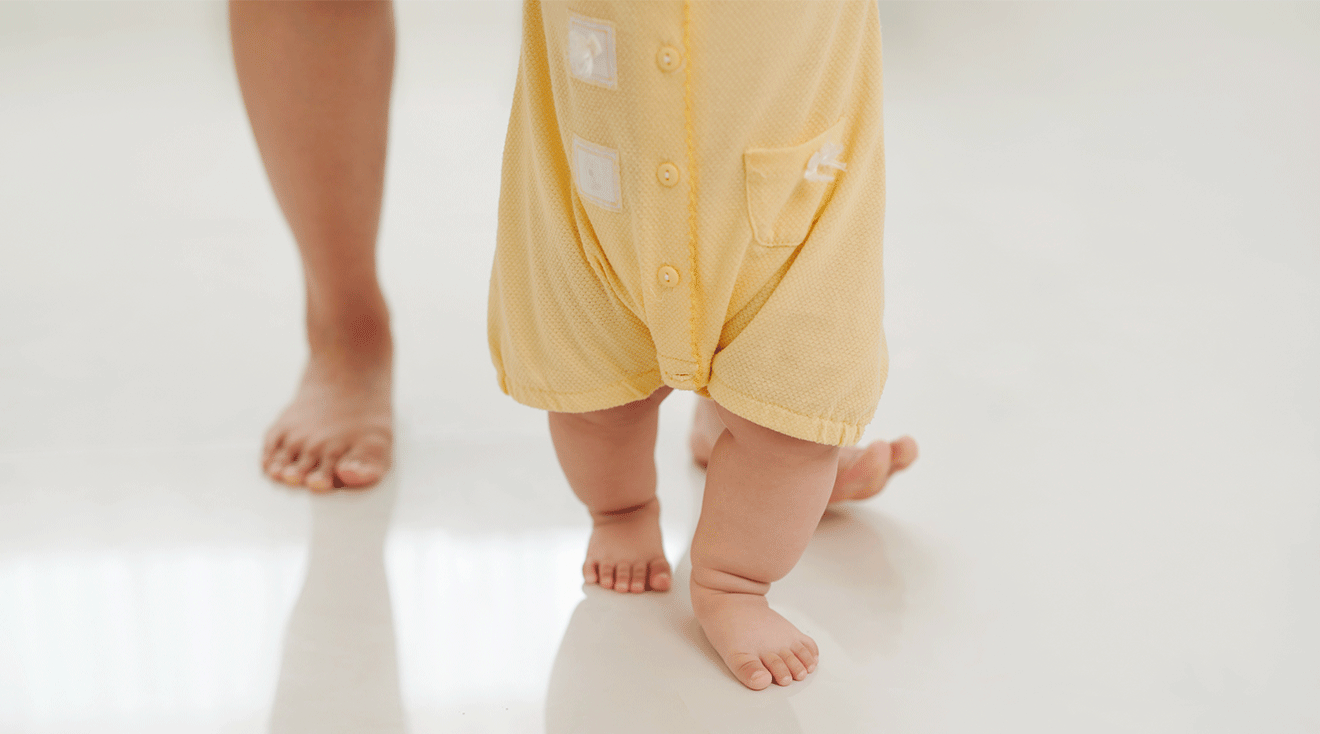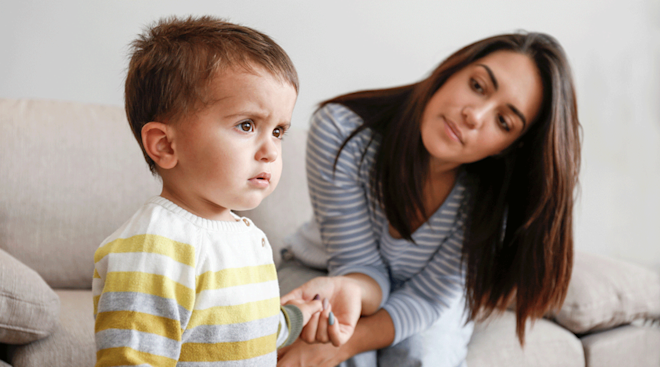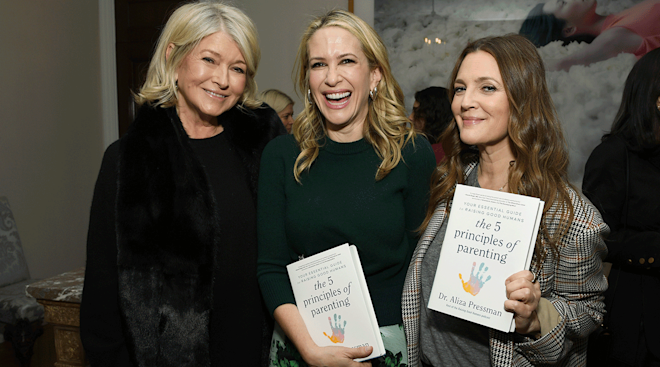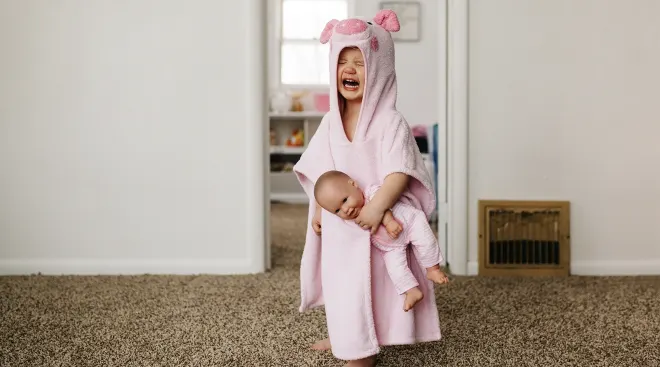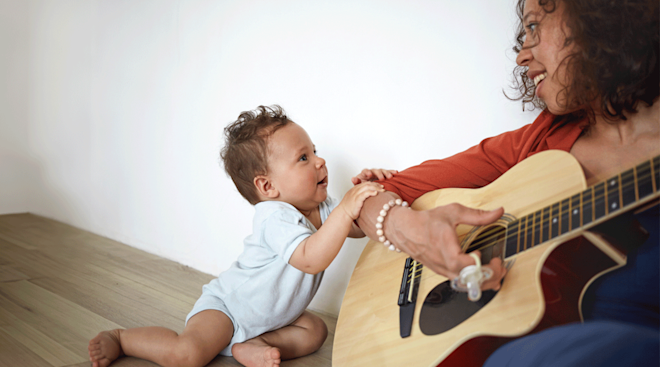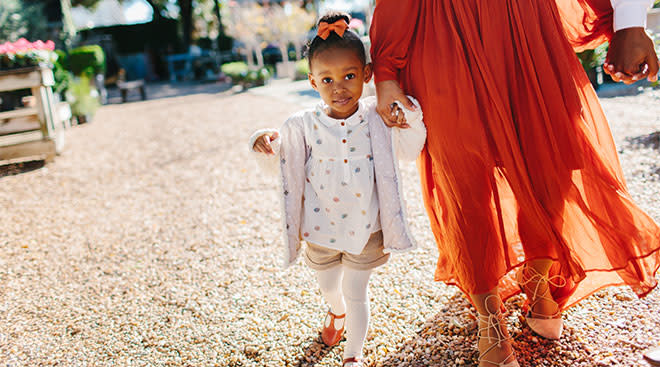The Effects of Hurried Child Syndrome—and How to Embrace a Slower Pace
Have you ever tried to convince a toddler to get their shoes on when you’re running late for daycare? Beg a dawdling kiddo to ”just. brush. your. teeth?” Let out a primal scream when said child refuses to stop what they’re doing to make it to a scheduled activity? Kids are prone to procrastination—after all, they live in the now. They’re all about being present–which is a beautiful thing and all, until you’re pulling your hair out trying to get somewhere on time. It’s enough to make your grays grow.
Yes, it’s incredibly frustrating when your child isn’t doing what they’re “supposed” to be doing in the moment, but our kids are often trying to tell us something when they dig their heels in and put up a fight. Ready for this simple nugget of truth? Here goes: We’re doing too much. We’re rushing too much. We’re hurrying their childhoods and pushing their development and setting unrealistic expectations. We’re burning them out while running ourselves ragged—and it’s not doing anyone any favors.
This perpetual state of haste has a name; it’s called hurried child syndrome, and in some ways it’s forcing our kiddos to grow up too fast. The good news is that as a parent you can hit the pause button and slow life down a little. Below, some ways this go-go-grow lifestyle is negatively impacting our families, plus a few tips to regain a more manageable pace.
A concept coined by David Elkind in his book, The Hurried Child, hurried child syndrome is the idea that we’re putting children in situations that exceed their developmental capacity. “We’re scheduling [kids] like mini-adults without building in time for relaxation, play and—gasp—even boredom,” says Lauren Cook, PhD, a clinical psychologist and the author of Generation Anxiety. We’re also just rushing our kids too much. “We’re pushing them out the door, on to the next extracurricular, and never giving them time to just relax and be kids,” adds Cook.
This constant state of pressure and doing is often a result of over-scheduling by caretakers, says Amber Thornton ,PsyD, a clinical psychologist in Washington D.C. And it’s done with the best of intentions—in hopes that we’ll help our kids meet developmental milestones or even get ahead of the curve.
Believe it or not, “the family dynamics of the ‘hurried child’ can be seen as early as pregnancy,” says Eileen Santa-Sosa, PhD, pediatric psychologist at Children’s Health and assistant professor at UT Southwestern. “Parents are exposed to marketing of products that claim to help them develop their child’s ‘genius,’” she adds. Further, “parents who overstimulate their babies or push them to meet milestones early can contribute to this,” says Thornton. “This might look like encouraging a very young child to walk sooner than they’re [capable] or introducing solid foods before the child demonstrates readiness.”
Of course, all this hurrying might not really be noticeable until the toddler phase comes in like a wrecking ball. “This is when parents can get into a push-and-pull dynamic where they get frustrated,” says Cook. “When parents don’t factor in these reproaches and rebuffs, they can get flustered. And so the rushing and hurrying begins.” This sets off a cycle where transitions (which are hard enough as it is for kids) become a source of agitation for parents and children.
Beyond the inevitable exasperation, the real repercussions of a harried lifestyle might seem few and far in between for a while (you’re just enthusiastically parenting after all!). But “as children get older, the pressure can increase, especially with the rise of academic competition and extracurricular activities,” says Thornton. In other words, consequences will emerge.
Suffice it to say, young kids will experience big feelings when they’re being rushed along. And this, of course, can lead to tantrums and meltdowns in the moment. This is just the tip of the iceberg, though.
“In the long-term, kids may feel like they don’t have much autonomy over their lives. They may feel overextended but don’t know how to advocate for themselves,” says Cook. “This can lead to people-pleasing, internalized resentment and anger and difficulty voicing (or even knowing) what their own needs are.” Anxiety, burnout and relationship strain …… “They’re constantly on the go, and they’re not learning how to meaningfully rest… They’re not learning how to sit with boredom,” says Cook. Moreover, when kids are being whooshed from one activity to the next, they have less time for unstructured play which is key for driving creativity and imagination. All of this can eventually lead to diminished mental health for youngsters. “Hurried children are at a higher risk of developing issues like depression, anxiety and decreased self-esteem and self worth,” Thornton says.
Of course, sometimes, rushing is an unavoidable part of life. You can’t give in and stay home just because your toddler wants to watch another episode of Bluey. However, if there are ways to buffer in some time and effort to prevent any sort of chaotic energy, both you and your children will benefit.
You see, it’s not only kids who are suffering the consequences of hurried child syndrome: “Many parents are anxious themselves,” says Cook. “This hurrying is simply a result of a years-long pattern where we were rushed ourselves… We feel like we’re not doing a ‘good job’ if we don’t over-program our children with activities… We feel like we’re failing if we don’t provide as many opportunities to our children as possible.”
Fortunately, you have a choice. You can make the conscious decision to get off automatic pilot. You can choose to live in the now—just like your toddler. You can adjust the pace of life and hurry less. Below, some tips to help get you started.
Give yourself ample time
Try to cushion in extra time where you can. Cook suggests setting the alarm 10 minutes earlier in the morning before school or activities: “This will allow you to actually connect with your kids before school, rather than focusing solely on shoving them out of the door.” (Of course, this can be easier said than done, particularly if you’ve got grumpy non-morning people at home!)
Build in free days
Intentionally carve out days where you can unwind or simply see where the day takes you without a prescribed schedule, advises Cook. She also advocates for saying ‘no’ to plans when they truly don’t serve you or your family.
Regulate your feelings
Feeling late or rushed or hurried can lead to frustration, which manifests as yelling, snapping or turning steely. “As adults, we have to work through our own response patterns so that we can respond calmly when our kids may be taking longer than we’d like,” says Cook.
Rely on your support system
If you’re trying to do it all, you’re going to feel scattered and hurried. “Don’t be afraid to ask for help. Our kids benefit when they’re learning from a multitude of people, so see your delegation as a strength, rather than a shortcoming,” says Cook.
Curate your kids’ activities
Over-programming our kids has become the norm, but you can break that cycle. “We need to check in with them about what they’re enjoying and learning from. Rather than forcing those piano lessons or making them play soccer when their heart isn’t into it, empower them to find activities that do feel meaningful,” says Cook.
Prioritize sleep
Ensure your child gets enough sleep each night to support their physical and emotional health, advises Thornton.
Lead by example
“Model healthy habits and a slower pace of life for your child,” says Thornton. Remind your kids and yourself that you can and do enjoy the little things in life. There’s no escape from some degree of hurrying. Raising kids and having a family is by nature, well, a frenzied experience. But Cook reminds parents that relationship building with our children is in the “being—not the doing.” She adds, “Our presence alone is what nurtures and quells anxiety.” Just being with your kids and showing them love and respect can help them develop and grow more than any single activity.
Please note: The Bump and the materials and information it contains are not intended to, and do not constitute, medical or other health advice or diagnosis and should not be used as such. You should always consult with a qualified physician or health professional about your specific circumstances.
Plus, more from The Bump:
Lauren Cook, PhD, is a clinical psychologist and the author of Generation Anxiety: A Millennial and Gen Z Guide to Staying Afloat in an Uncertain World. She helps clients in California at her private practice, Heartship Psychological Services.
Amber Thornton, PsyD, is a licensed clinical psychologist and advocate for the mental health and well-being of parents. She holds a BS in psychology from The Ohio State University and PsyD in clinical psychology from Wright State University School of Professional Psychology. She’s an Ohio native who has made Washington, DC her home since 2018.
Eileen Santa-Sosa, PhD, is a pediatric psychologist at Children’s Health and assistant professor at UT Southwestern.
Learn how we ensure the accuracy of our content through our editorial and medical review process.
Navigate forward to interact with the calendar and select a date. Press the question mark key to get the keyboard shortcuts for changing dates.

































